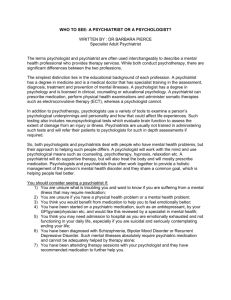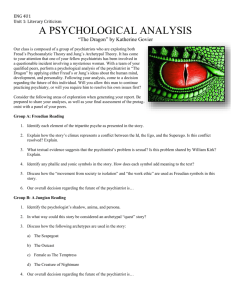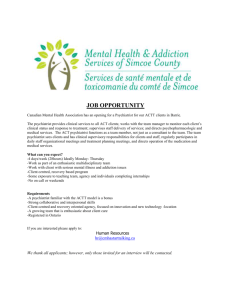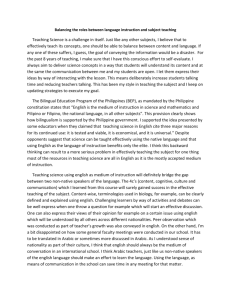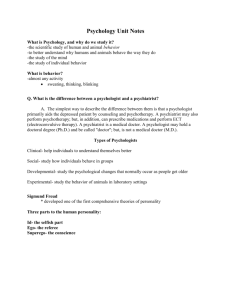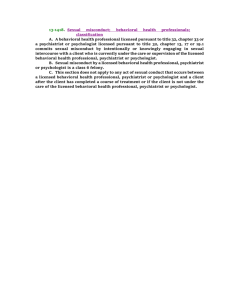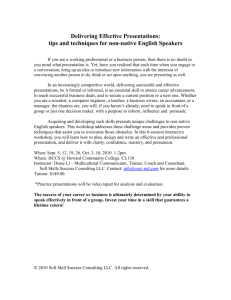Introduction and Research Methods
advertisement
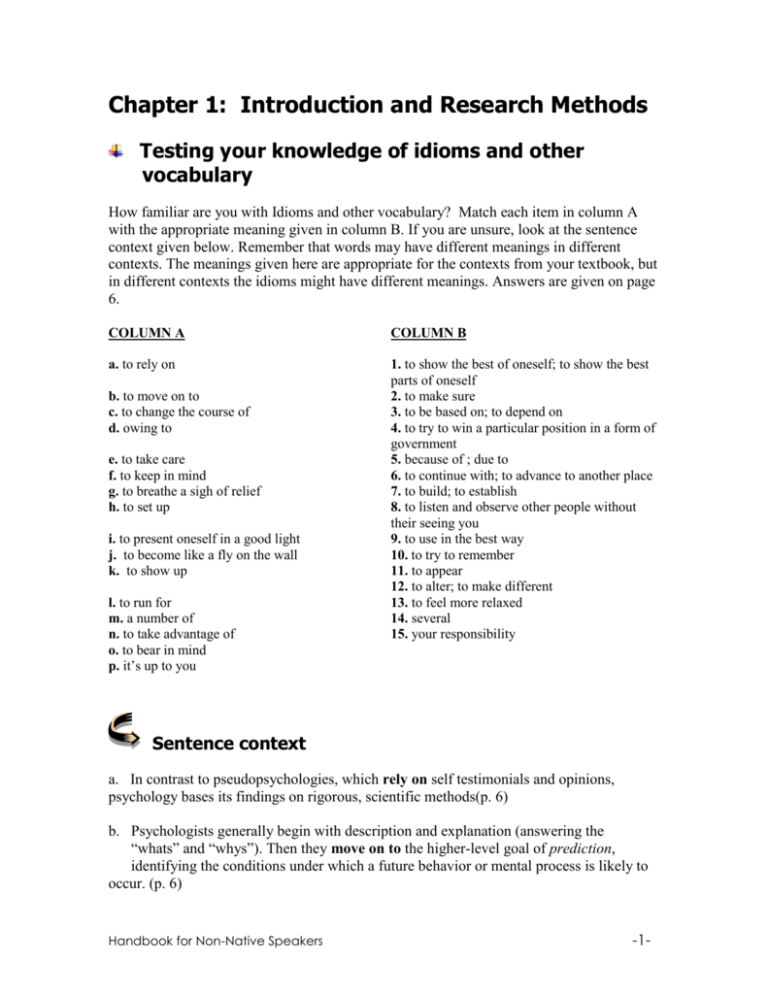
Chapter 1: Introduction and Research Methods Testing your knowledge of idioms and other vocabulary How familiar are you with Idioms and other vocabulary? Match each item in column A with the appropriate meaning given in column B. If you are unsure, look at the sentence context given below. Remember that words may have different meanings in different contexts. The meanings given here are appropriate for the contexts from your textbook, but in different contexts the idioms might have different meanings. Answers are given on page 6. COLUMN A COLUMN B a. to rely on 1. to show the best of oneself; to show the best parts of oneself 2. to make sure 3. to be based on; to depend on 4. to try to win a particular position in a form of government 5. because of ; due to 6. to continue with; to advance to another place 7. to build; to establish 8. to listen and observe other people without their seeing you 9. to use in the best way 10. to try to remember 11. to appear 12. to alter; to make different 13. to feel more relaxed 14. several 15. your responsibility b. to move on to c. to change the course of d. owing to e. to take care f. to keep in mind g. to breathe a sigh of relief h. to set up i. to present oneself in a good light j. to become like a fly on the wall k. to show up l. to run for m. a number of n. to take advantage of o. to bear in mind p. it’s up to you Sentence context a. In contrast to pseudopsychologies, which rely on self testimonials and opinions, psychology bases its findings on rigorous, scientific methods(p. 6) b. Psychologists generally begin with description and explanation (answering the “whats” and “whys”). Then they move on to the higher-level goal of prediction, identifying the conditions under which a future behavior or mental process is likely to occur. (p. 6) Handbook for Non-Native Speakers -1- c. It expanded the scope of psychology to include research on emotions and observable behaviors, initiated the psychological testing movement, and changed the course of modern education and industry. (p. 10) d. Although you will learn a great deal about psychological functioning in this text and in your psychology class, take care that you do not overestimate your expertise. (p. 20) e. Just as Hans’s questioners unintentionally signaled the correct answer by lowering or raising their heads, an experimenter might breathe a sigh of relief when a participant gives a response that supports the researcher’s hypothesis. (p. 22) f. One technique is to set up objective methods for collecting and recording data, such as audiotape recordings to present the stimuli and computers to record the responses.(p. 22-25) g. For example, participants may try to present themselves in a good light (the social desirability response) or may deliberately attempt to mislead the researcher. (p. 26) h. You would attempt to be as unobtrusive as possible, to become, as they say, “like a fly on the wall.” (p. 29 Figure 1.7) k. As a result, “she has not learned the telltale signs that announce possible danger and possible unpleasantness, especially as they show up in the face of another person...” (p. 30) l. Maria is thinking of running for student body president. (p. 37, Check & Review) m. There are a number of ways to actively read, remember, and master a college text. (p. 40) n. How can you be a more successful student (and test taker) and take full advantage of all the special features in this text? (p. 40) o. Also, bear in mind that information relevant to one question is often found in another test question. (p. 45) p. However, it is up to you to discover their office hours and office location. (p. 46) Handbook for Non-Native Speakers -2- Reviewing your knowledge of English grammar One of the most basic facts to remember about English grammar is that singular verbs require singular subjects, and plural verbs require plural subjects. This means that almost all nouns occurring together with plural verb forms require an -s or -es ending. Compare: A psychiatrist studies human behavior. (singular noun) (singular verb) Psychiatrists study human behavior. (plural noun) (plural verb) Review your knowledge of this basic fact of English grammar by adding -s or -es endings as needed in the blanks provided below. Note that some of the blanks will require no ending. When you are finished, you may check your answers in the answer key section. Clinical psychologist__ work with mentally ill or emotionally disturbed people by doing therapy or counseling. Student__ often wonder about the difference between a psychiatrist and a clinical psychologist. A psychiatrist__ is a true medical doctor who has gone to medical school. In fact, most psychiatrist__ have received their M.D. degrees with a specialization in psychiatry. Because of this medical training, a psychiatrist__ is licensed to prescribe medication or drugs. Clinical psychologist__, on the other hand, have not gone to medical school and cannot prescribe drugs. The typical psychologist__ has gone to graduate school and has received a Ph.D. degree after intense study of human behavior and methods of therapy. Handbook for Non-Native Speakers -3- Finding key information One technique that the authors frequently use in this chapter is to compare two terms or concepts and give you parallel information about each. Study the paragraph in the section above comparing psychiatrists to clinical psychologists. Notice how the authors give you parallel information about each type of scientist: Clinical Psychiatrist Psychologist has gone to medical school has gone to graduate school has an M.D. degree has a Ph.D. can prescribe drugs cannot prescribe drugs Look at the paragraph in your textbook comparing basic and applied research (p. 16). Study this section; then, fill in the missing information about basic research in the chart below. When you are finished, you may check your answers in the answer key section. Basic Research Applied Research is conducted in the real world (for example, in industry) its purpose is to solve existing real-world problems it has real world applications example: safety and design improvements in machinery Handbook for Non-Native Speakers -4- Examining structural clues Because it serves as the introduction to the entire book, this chapter contains some important definitions. In English, definitions can be introduced in a number of different ways: The definition may be contained within parentheses. All behavior can be viewed as a response to a stimulus (an object or event, either internal or external, that stimulates or causes an organism to respond). It may be set off by dashes. Some behaviors are overt--easily seen or identified. It may be introduced by a relative pronoun. Applied research is research THAT utilizes the principles and discoveries of psychology to solve real-world problems. It may contain the verb BE plus a prepositional phrase. A case study IS an in-depth study OF A SINGLE RESEARCH SUBJECT. Locate 5 definitions in this chapter which you think are particularly important and write them in the spaces provided below. Study them to see if they follow the patterns listed above. 1. ______________________________________________________ ______________________________________________________ 2. ______________________________________________________ ______________________________________________________ 3. ______________________________________________________ ______________________________________________________ 4. ______________________________________________________ ______________________________________________________ 5. ______________________________________________________ ______________________________________________________ Handbook for Non-Native Speakers -5- Answer key Testing your knowledge of idioms and other vocabulary a. 3; m. 14; b. 6; n. 9; c. 12; o. 10; d. 5; p. 15; e. 2; f. 10; g. 13; h. 7; i. 1; j. 8; k. 11; l. 4; Reviewing your knowledge of English grammar Clinical psychologists work with mentally ill or emotionally disturbed people by doing therapy or counseling. Students often wonder about the difference between a psychiatrist and a clinical psychologist. A psychiatrist is a true medical doctor who has gone to medical school. In fact, most psychiatrists have received their M.D. degrees with a specialization in psychiatry. Because of this medical training, a psychiatrist is licensed to prescribe medication or drugs. Clinical psychologists, on the other hand, have not gone to medical school and cannot prescribe drugs. The typical psychologist has gone to graduate school and has received a Ph.D. degree after intense study of human behavior and methods of therapy. Finding key information Basic research is usually conducted in universities or in research laboratories. Its purpose is to explore new theories and advance general scientific understanding. It may not have any real-world applications. An example is research linking aggression to testosterone or research on general cognitive processes. Examining structural clues Answers will vary. Handbook for Non-Native Speakers -6-
